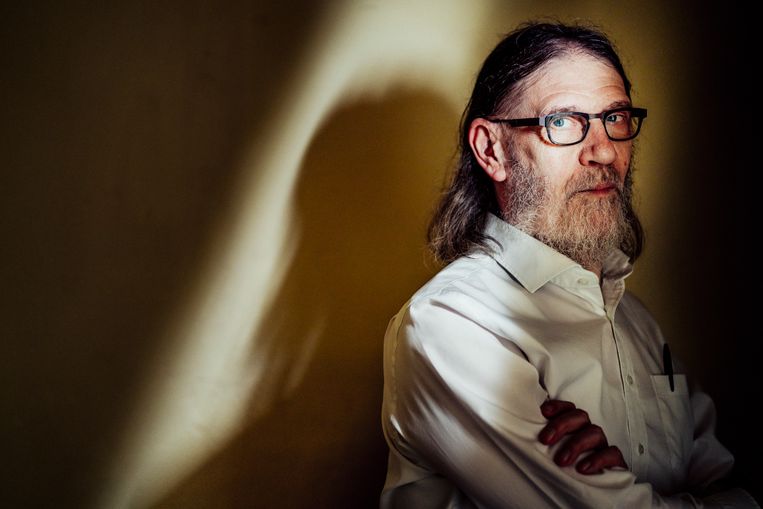“I have been fascinated by the concept of infinity all my life, ever since I encountered it in mathematics,” says Jan-Paul van Bendigem. “Since then, the question of whether perfection is possible continues to excite me.”
It’s statement and – spoiler at the same time! – Conclusion of your book: Perfection or completeness does not exist because there is always a flaw in them. We always face limitations.
“Yes, there is always what I call, religion and noise. Noise refers to the constantly turbulent world, the noise that occurs when we speak imperfectly of this world.”
You give the example of your enormous filing cabinet. Once it started as an all-out attempt to bring order and order to your notes and reading, it has turned into a mixture of things that just don’t fit together. Can this model represent all of our efforts to map the world?
Yes. I really wanted to ‘organise’ everything in this filing cabinet. (Laugh) But each classification has its differences and variety in the end: things that don’t fit anywhere else. As far as I’m concerned, perturbation of the system is often more interesting than the system itself. Take Mendeleev’s table. right Now (Where all known chemical elements are arranged, ed.). I am convinced that it has not yet reached its final stage. As with any order, you will encounter ambiguous limits. For example, the latest discovered elements, created in laboratories, sometimes exist only a billionth of a second. This raises an interesting philosophical question: How long does something have to exist in order to say: it exists? And how long does an element have to exist to be included in Mendeleev’s table? ”
You can also give the example of the “theory of everything”, which attempts to reconcile the various fundamental theories of physics. It’s still so full of holes and rarities that it almost becomes a comedic.
“Yes. Meanwhile, I’m not against science in any way. This goes hand in hand with a lot of tinkering. I was recently asked if I’d like to lecture about the Corona past years and how I lived them as a philosopher of science. At first I had doubts About if I had anything to say about it, but then it dawned on me that it was a unique period where people outside the academic and scientific world could suddenly see science in action from the first row.It was as if the curtains had been pulled between the podium and the wings. Suddenly everyone took a look behind the scenes of science and it seemed to confuse a lot of people: “What are these scientists doing? They claim something, then take it back…”
This constant adjustment, what she calls “placebo work,” has already frightened many people away from science.
“Yes, because in general we give stage image a lot to use my images. That is now broken. That is why I am a big supporter of the Ghent University Museum: it focuses on the whole scientific process. Skepticism, failures and ‘misinterpretations’ are an essential part of science.”
Admitting that perfection in science is unattainable is not the same as declaring bankruptcy?
“For me, that is the gist of it: not because I had doubts, doubts, or incompleteness that I could no longer commit myself to something. Knowing I could hear then: It was a little different than we thought.”
You might also ask yourself: If we’re destined to fail anyway, why would we go to all these troubles?
Reminds me of my favorite poem by Samuel Beckett: ever tried. ever failed. Did not matter. Try again. fail again. better fail. The highest that can be achieved is a more elegant form of failure. To say it doesn’t matter how you walk, because there is no access anyway, in my opinion, beside the point. The road is everything. It is useful to at least have an idea of the possible arrival. Even though you know you’ll never get there.”
You must have an ideal that you live by, even though you know that ideal is unattainable?
“Yes, perfection would also be very overwhelming. I always think of the famous Mies van der Rohe pavilion in Barcelona, which was rebuilt after the 1929 World’s Fair. In terms of architecture, that is sublime. There is only one annoying factor: people should not be allowed to roam The same thing happened with Ludwig Wittgenstein (Twentieth Century Philosopher, editor).† At a certain point, he built a house at the request of one of his sisters. But when they entered that house, her reaction was, “Ludwig, what have you done now? This is a house for gods and not for men.”
You have a great passion for all forms of order and higher systematics, such as mathematics and logic. What do you like most?
“The source is that I can’t describe it any other way – being socially maladaptive. I find human traffic to be complex. Give me any math problem: OK. I know how to handle that. But I have always found social life to be very complex, with all those implicit intentions “People say this, but they actually mean it. Then mathematics is very attractive. To me it has often been a place to retreat to.”
I’d rather find a generic scheme that you can enforce anywhere. But this is like a wall to wall rug which is too big for the room in question. If it is in one corner, it is no longer right in the other. You never get it right.”
I have been president of SKEPP, the study circle that critically examines pseudoscience and the paranormal. But as a scientist, you love dealing with issues like infinity.
“I have no problem saying that there are a lot of things I can’t answer right now. Quite the contrary. I get spontaneously suspicious when someone comes to me with the answer to everything. It just doesn’t exist. Once you push a little bit, you’ll come Always with questions that make you say, ‘Well, we’d better put this on hold. We’ll see.’
Your book also has a social dimension. There is a widespread belief in complete and perfect control.
“Yes. The trend of wanting to direct, control and manipulate human life in what I call absurd detail is very much alive today. We want a coach for just about everything, and if need be, we also want a coach for the coach: a coach. Then I think that becomes Silly. There has to be a point somewhere where you say, ‘Okay, we’ll see. We’ll see how it goes and adjust if necessary. It’s better to let some things go, otherwise you’ll run into noise.’

Are we under the spell of perfection and control?
“Yes. One of the photos that has struck me so hard lately as an expression of this pursuit of perfection is a family photo of the Kardashians. I think it’s easy to fool people into thinking they are a new group of robots, humanoid robots. I find him almost sinister.”
You cite several examples of our being forced to control: smart water bottle Indicate when to drink, and happy thorn Which indicates that we are eating too quickly, or a mattress that deviates the partner from his side. These are funny examples, but they represent a trend that spans all walks of life, often with disastrous consequences.
“Yes, we rely a lot on data, algorithms, and deep learning, but we forget that there are limitations to that. For example, you need very large data sets to feed such a program, but this data is often rife with deviations and prejudices. So they go. You literally feed them noises. And then you notice that these programs simply take over or even reinforce abuses like racism and inequality between men and women.”
Can I sum it up like this: We use systematics so as not to get lost in the world of chaos, but after a while we get lost in systematics.
“Yes. We are so concerned with this total classification and control, that we lose ourselves in all the work it takes to keep things running and to be able to keep claiming: one day we will figure it out completely or have total control. Which wouldn’t be the case. “.
You argue instead to embrace our flaws.
Or as a call to use the phrase ‘we’ll see’ more often. Let me give you an example of one of my last meetings at VUB. Getting older in a business case means things repeat themselves. For example, in my career there have been countless meetings Her about student recruitment. Then it was always the challenge of preparing the “ultimate handbook”: a handbook that, once you read it, would immediately make you head to VUB. This, of course, never worked. It was discussed again in one of my last meetings. Then I said, “Listen, I have an alternative idea. I can’t give an exact forecast, but the same applies to the other proposals. On the other hand, my proposal is very cheap. In the meantime, I received the full attention of everyone present. “My suggestion: we will see.” Then I saw the appearance: he can now retire “. (Laugh)
Why is it so hard for us to give up? It seems that our desire for control is only increasing.
Why do you want to climb a mountain? Because it’s there. Today we have the means to look at the world in such detail and to be able to better appreciate and calculate things. Well, we’ll do that too. But that measurability gets to us. I know people who step in. 10,000 steps a day for their health, and then they stop at 1001. That wasn’t the intention again. We extend that to other aspects of life and we’re just measuring. That just doesn’t sound healthy to me.”
So what is the message? Leave often? Keep emphasizing that absurdity is part of life and perfection does not exist?
“Yes, and to be more aware that there are limits to what we can do. This is healthy, but it requires self-knowledge. I used to play the piano, but for the past ten or fifteen years I’ve neglected it. I’d like to record it again, but I also know that There is a limit to my time, so chances are I won’t. Well, that’s it then.
“The fundamental limitation of everything, of course, is the finiteness of life. Death does not come into the picture clearly with age, but I am more intensely involved in the things that are essential to me, the things that I still want to spend time on. I know that my time Limited.
“Yesterday I had lunch with Kees van Cotten. He is now eighty. Nowadays, when I get a book of over five hundred pages, I think about it sometimes,” he said. “I can relate. That is why I launched the idea in The book, as a counterpart to the damned collection list, is to make a never-ending list of things you don’t want or will do in your life. I think it’s a very funny idea to lie on your deathbed and then look: Is something omitted? No. A good thing too.” (Laugh)
Jean Paul van Bendigem, Noise and noiseTick wood, €24.99.

“Total coffee specialist. Hardcore reader. Incurable music scholar. Web guru. Freelance troublemaker. Problem solver. Travel trailblazer.”







More Stories
1,800 new cases of whooping cough, including fifty cases in children
Crash testing in space has a Dutch touch – Dutch cowboys
Why are men always warmer than women?